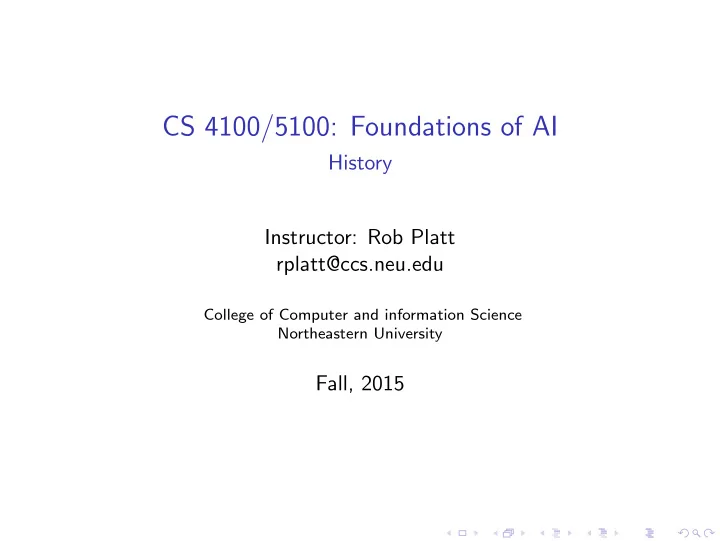

CS 4100/5100: Foundations of AI History Instructor: Rob Platt rplatt@ccs.neu.edu College of Computer and information Science Northeastern University Fall, 2015
What is AI: the Turing Test Image: Hwee Tou Ng, AI lectures
A short (and scattered) history of AI ◮ 1952, Arthur Samuel: developed a computer program that could play checkers (using an early version of alpha-beta pruning).
Irrational Exuberance Herbert Simon (1957): ”It is not my aim to surprise or shock you – but the simplest way I can summarize is to say that there are now in the world machines that think, that learn, and that create. Moreover, their ability to do things is going to increase rapidly until – in a visible future – the range of problems they can handle will be coextensive with the range to which the human mind has been applied.” Image: Wikicommons
A short (and scattered) history of AI ◮ 1960, Donald Michie: MENACE (Matchbox Educable Noughts And Crosses Engine) – a program that learned to play an optimal game of tic-tac-toe (an early version of RL).
A short (and scattered) history of AI ◮ 1962, Frank Rosenblatt: Percptrons. Proof that simple neural network learning algorithms can learn any pattern that can be represented by the network. ◮ But, it turns out that many interesting functions cannot be represented this way: xor, for example.
A short (and scattered) history of AI ◮ 1964–1966, Joseph Weizenbaum: ELIZA, natual language interation based on scripts.
A short (and scattered) history of AI ◮ late 1960s, Nilsson et. al. : Shakey project at SRI (occasioned the development of STRIPS, an early planner).
A short (and scattered) history of AI ◮ 1972, Terry Winograd: SHRDLU, natual language understanding in the context of a ”blocks world”.
Recommend
More recommend